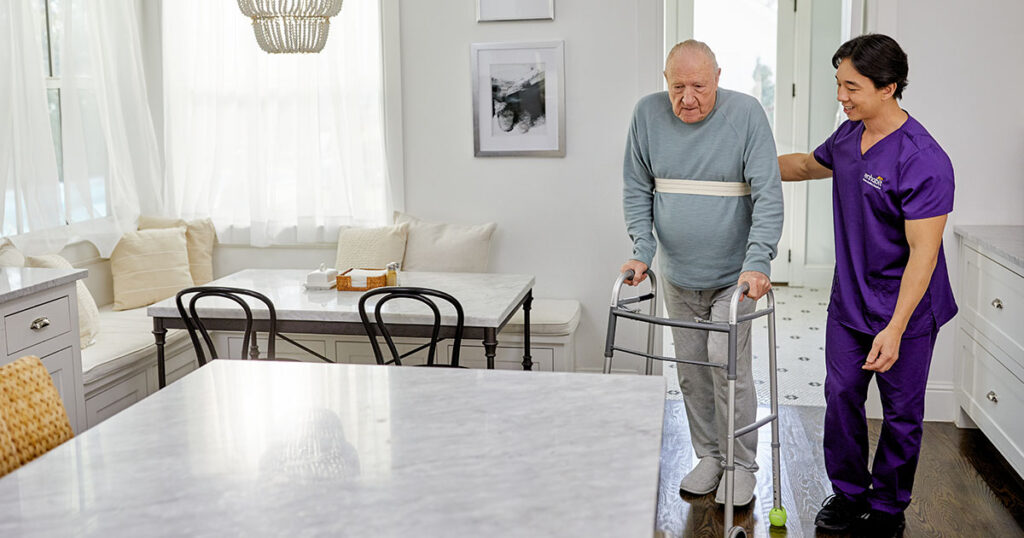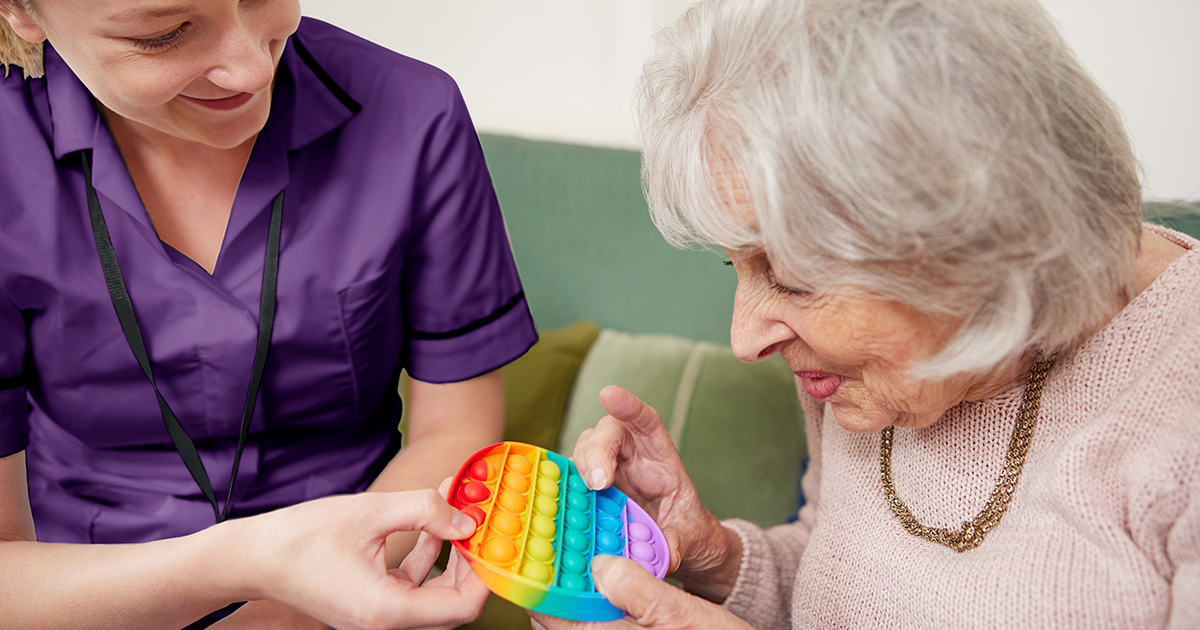Home health occupational therapists use a patient’s everyday environment to understand a patient’s daily routine. This maximizes the effectiveness of therapy, as patients are using their everyday environment to learn, maintain or improve skills to better their quality of life.
“When I think about being a home health occupational therapist, I think about aging in place,” Patricia D’Arena, vice president of clinical excellence at Enhabit Home Health & Hospice, said. “This is the ultimate goal – keeping our patients in their homes where we can teach them and their caregivers how to stay as safe as independent as possible so they can remain in their homes.”
Home health occupational therapists use treatments to help restore daily living skills and basic motor functions of patients. They also focus on compensating for any loss of function that patient may be experiencing.
What does a home health occupational therapist do?
Home health occupational therapists do a lot of different things for different patients, meaning their day-to-day tasks can always look different.
Some of the main duties of home health occupational therapists include:
- Reviewing and evaluating a patient’s needs and observing them doing everyday tasks in the home
- Developing a treatment plan for patients, identifying specific goals and the types of activities that will be used to help the patient work toward those goals. This includes:
- Providing techniques that regain function and independence
- Introducing adaptive equipment for safer self-care practices
- Teaching adaptive strategies to accommodate for visual deficits
- Utilizing energy conversation techniques
- Offering ways to increase participation in leisure activities
- Educating patients and caregivers
- Recommending environmental changes for a safe home setting

Helping people be the best they can be
According to Mette, a home health occupational therapist at Enhabit Home Health & Hospice, her job is all about one thing – helping people be the best they can be.
“With my patients, I hone in on what’s important to them,” she said. “I have some patients who don’t care about being able to put on their socks and shoes by themselves. Okay, that’s fine – what do they really want to be able to do? When I know what’s important to them, I can help them be the best they can be and improve their quality of life.”
Mette, OT
Each patient requires a different set of equipment and assistance. One patient may need a special bath bench due to the shape of their shower. Another patient may not be able to turn their wheelchair due to a loss of function in their hand.
Occupational therapists are there to help patients navigate these challenges with creative and useful resources. Then, they can get patients back to doing the things they loved before their injury.
“My favorite thing about being a home health occupational therapist is the challenges that may present themselves – like a funky-shaped bathroom or a sunken-in living room,” Mette said. “I love the challenge of figuring out how to help my patients navigate these things in their homes. I’m a very creative person so occupational therapy plays to my strengths in that way.”
What sets home health occupational therapy apart?
When a patient chooses occupational therapy at a rehabilitation facility, this requires that they travel to a location for each appointment. They have to use the facilities’ resources and equipment and then get sent home to further their progress on their own.
With home health occupational therapy, the therapist comes directly to a patient’s home. They can then help them navigate the unique factors of their environment.
“When patients go to the rehabilitation hospital, they do get better but everything in that facility is already accessible and adaptable,” Mette said. “Occupational therapy makes you really think outside the box on trying to solve the problems my patients were having going from hospital to home.”
The goal of home health care is to keep patients safely at home, giving them the opportunity to age comfortably in place instead of a hospital or clinic environment. Home health occupational therapists work directly with the patient’s daily routines and functions to build back independence.
“Occupational therapy is important to the home health environment because we have a unique perspective on how to help people live to their maximum function in their homes safely,” Mette said. “It significantly improves the quality of life of patients when they are able to feel like they can do something for themselves and not have to depend on others – even if it is something as simple as being able to button your shirt.”
How do I become a home health occupational therapist?
There are many benefits that come along with choosing a career in home health care. If you are interested in helping patients achieve their health care goals, home health occupational therapy might be a good career focus for you.
“I’ve been in the industry for 30 years and I just love it,” Mette said. “I have had several opportunities to do something else and I don’t want to do anything else. I love occupational therapy.”
In order to become a home health occupational therapist, you must first earn a bachelor’s degree in health science, biology, physiology or a related field. After getting a bachelor’s degree, most pursue a master’s degree. But you can also go to school to get your doctoral degree in occupational therapy.
Once you have the appropriate degrees, you will need to pass the National Board of Certification of Occupational Therapy (NBCOT) to become a certified occupational therapist.
If you are interested in pursuing your home health occupational therapy career at Enhabit, you must be a graduate of an approved school of occupational therapy and licensed as an occupational therapist in the state in which you currently practice.
To learn more about home health career opportunities at Enhabit, search our open career opportunities near you or sign up for job alerts by texting “CARE” to 98199.
Social Share
At Enhabit our patients are our number one priority. From providing the latest medical practices to building deep personal connections, we’re focused on upholding every patient’s dignity, humanity and sense of control on their health care journey.
Home health
Our home health services give patients access to the care they deserve in the comfort of their own homes. From disease and injury management to recovery from surgery, our clinicians help patients confidently achieve their healthcare goals.
Hospice care
Our hospice care services place importance on the comfort of every patient living with a terminal illness. Our caring professionals are dedicated to providing not just physical care, but spiritual and emotional support to every patient and their loved ones.


 Back to Resource library
Back to Resource library




